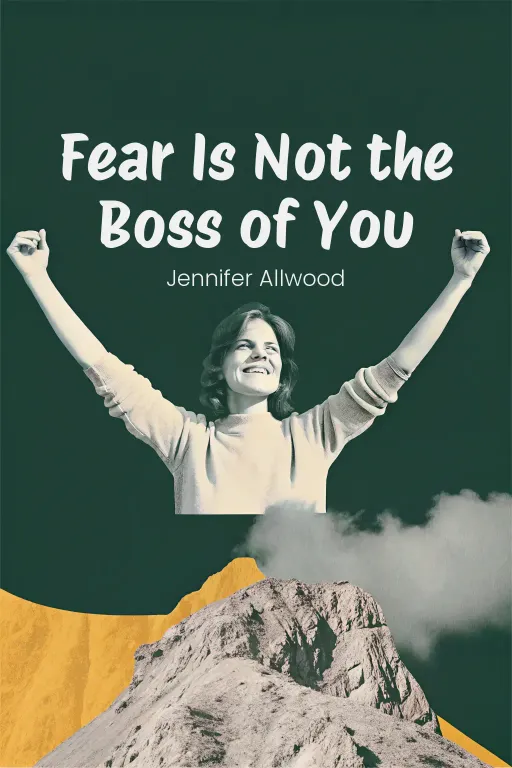
Defeat Fear: Your Courage Roadmap
Podcast by Beta You with Alex and Michelle
How to Get Out of Your Head and Live the Life You Were Made For
Defeat Fear: Your Courage Roadmap
Part 1
Alex: Hey everyone, welcome back! Today we're tackling something super relatable: fear. Whether it's fear of screwing up, fear of what people think, or just that general unease about the future, it really holds so many of us back. Michelle: You know, Alex, fear isn't exactly quiet about it either, right? It's like that super annoying backseat driver who second-guesses every single decision you make and then convinces you to just pull over! Alex: Exactly! But that’s why we’re excited to talk about Jennifer Allwood’s book, “Fear Is Not the Boss of You”. It's like a guide for anyone ready to actually move forward, for real. It’s full of personal stories, really practical advice, and a super inspiring emphasis on faith and purpose. Allwood basically walks you through facing your anxieties, embracing courage, and stepping confidently into the life you’re meant to live. Michelle: "Confidently" You know, I'm all for courage, but what about when you're just buried under that mountain of… stuff? Alex: Right, and that's where the book really stands out, Michelle. So, today we're going to break it down into manageable steps. First, we will talk about the sneaky things—you know, comparing ourselves to others, feeling overwhelmed, and that constant tug of guilt—that trap us. Then, we'll dig into building real courage, not the movie kind, but the practical, take-action-even-when-you're-scared kind. And finally, we’ll see how to really connect your choices to something bigger than yourself, like leaving a real mark on the world. Michelle: Okay, let me get this straight. Step one: identify the traps. Step two: trade those traps for a sledgehammer. And step three: actually, leave behind something worthwhile, not just a mess. Alex: you could put it that way! Okay, let’s dive right in.
Identifying the Struggle
Part 2
Alex: Okay, so picking up where we left off, step one, Michelle, is really about identifying the struggle—diagnosing “why” we feel stuck. This is crucial because, well, we can’t fix what we don’t understand, right? Michelle: Right, so it’s like a root cause analysis of “Why am I not achieving my goals?” I get it. Start with some brutally honest self-reflection. Got it. Alex: Exactly. And the book highlights a few common culprits: comparison, overwhelm, fear, and external influences like social media or even the people around us. Let's dive into comparison first, because honestly, it's one of the biggest traps. Michelle: Oh yeah, the classic “Why doesn’t my life look like their perfectly curated Instagram feed?” question. Honestly, sometimes I scroll through Instagram and start wondering why I don't own a yacht or have a walk-in closet filled with designer shoes. Alex: Exactly! Allwood talks about how social media amplifies this. You’re constantly seeing these highlight reels and mistaking them for someone's reality. It’s like comparing your behind-the-scenes bloopers to someone else’s highlight reel— not a fair comparison. Michelle: True, but knowing it’s unfair doesn’t just magically make it stop, does it? Social media is like… a funhouse mirror. You know it’s distorted, but it still messes with your head. Alex: Exactly! And that's where the danger lies, right? It creates this narrative in your mind – this little voice whispering, "You're not good enough, you're falling behind, you'll never catch up." It’s incredibly paralyzing. Michelle: It’s like playing a self-esteem Jenga game that completely collapses every time you scroll. So, how do we combat this? I mean, besides deleting all our apps and going off-grid? Alex: Well, the book doesn't suggest total isolation, more like… reframing your perspective. First, acknowledge that you’re only seeing snippets. Those snapshots aren’t the whole picture. Then shift the focus to your story. Ask: What are my goals? What actually matters to me? Michelle: So, instead of fixating on someone else’s exotic vacation, you focus on, "Hey, I managed to put on pants today, who’s winning now?” Alex: Precisely! And celebrate those wins, no matter how small. Allwood suggests journaling accomplishments or setting internal benchmarks instead of comparing yourself to external ones. Success isn’t universal, it’s deeply personal. Michelle: Alright, that actually sounds a lot healthier than my usual “avoid Instagram and binge-watch Netflix" strategy. But comparison isn’t the only obstacle, is it? Let's talk about overwhelm, which, by the way, is practically my middle name. Alex: Overwhelm is huge, and something many of us struggle with. It happens when the sheer number of tasks or decisions feels… crippling. Allwood shares stories about people, especially women, juggling careers, families, and personal aspirations, but then getting totally stuck because the mountain of responsibilities feels insurmountable. Michelle: Yeah, when your to-do list looks longer than "War and Peace," your natural instinct is to just…do nothing. Classic analysis paralysis. Alex: Exactly. Allwood shares this story of a young entrepreneur who abandoned her side project— not because she wasn't passionate about it, but because it became this overwhelming burden alongside her full-time job and family. Burnout and mental overload. Michelle: Ouch, that hits close to home. So what’s the solution? Is there a magic formula for juggling sixty things at once without losing your mind? Alex: It's about breaking things down. Allwood suggests prioritizing tasks into manageable steps. She mentions the Eisenhower Matrix—categorizing tasks by urgency and importance. That way, you focus your energy on what truly matters and… let the rest slide, at least for a while. Michelle: So, instead of panicking about everything at once, you just focus on the first domino that needs to fall? Alex: Exactly. And celebrate those small milestones. Progress, no matter how incremental, builds momentum. It's forward motion, not perfection, that matters. Michelle: Well, tiny steps are definitely better than no steps, I suppose. But let’s not forget the biggest obstacle of all: fear. That’s a whole different ball game. Alex: Right, and fear is often the root cause of feeling stuck. It traps us in what's familiar, no matter how unfulfilling, because the unknown seems like an even bigger threat. Michelle: The classic "better the devil you know" situation, right? Like, staying in a job you hate because hey, at least there’s a steady paycheck. Alex: Exactly. Allwood shares a story of someone dreaming of transitioning from a corporate job to becoming a photographer. But every time she thought about it, fear would creep in with questions like, "What if I fail? What if I can’t support myself?” Fear becomes a self-fulfilling prophecy. Michelle: Which raises the question: How do you know if fear is actually protecting you, or just being… dramatic? Like, “Don’t touch a hot stove” fear is real, but “What if my dreams don’t come true?” fear is more abstract. Alex: That’s such a good point. Allwood suggests asking yourself: Is this fear keeping me safe from harm? Or is it actually resistance to growth? If it's the latter, then it’s a sign you need to push through. Michelle: Easier said than done, though. Convincing yourself that fear is being dramatic when it feels so real can be challenging. Alex: True, but luckily, there are tools that can help. Mindfulness and visualization, for instance. Instead of defaulting to the worst-case scenario, try imagining what success would look like. What’s the best possible outcome? That simple shift can make fear less overwhelming and more… of a guide. Michelle: Okay, I like that. Fear as a guide instead of a roadblock. It’s like saying, "Thanks, fear, for pointing me in the direction I need to go." Alex: Exactly. And that then ties into aligning yourself with a broader purpose, but we're not quite there yet! For now, recognizing these factors – comparison, overwhelm, fear, and external influences – sets the stage for really building a way forward. It's about uncovering those chains before you start breaking them. Michelle: Alright, Alex. You've convinced me to analyze my chains, but I’m still ready to deploy my Netflix defense strategy if things get too heavy.
The Shift Toward Courage
Part 3
Alex: So, understanding what holds us back naturally makes us wonder how these things shape our path and what patterns keep us stuck, right? Michelle: Right. So, we've identified the chains – fear, comparison, feeling overwhelmed. What's the next step? How do we, you know, actually “move” forward? Alex: Perfect question, Michelle. This leads us to a core principle: courage. And it's really different from confidence. Michelle: Oh? How so? Aren't confidence and courage just, like, two sides of the same coin? Alex: Not exactly. Confidence often comes after success. It's knowing you've handled something before. Courage, though, is about stepping forward despite feeling afraid, with no guarantees. Michelle: Aha, so confidence is that "Been there, done that" feeling. Courage is more like, "I have no clue what I'm doing, but let's jump!" Alex: Precisely! Imagine someone about to do a high dive for the first time. It's not confidence that makes them jump. It's courage – leaping without knowing what’s next, but willing to try. Michelle: I get it. Solid metaphor, Alex. Honestly, that leap sounds terrifying. So, what is it that stops us from acting courageously in the first place? Alex: A lot of it comes down to waiting for the "perfect" moment. We think we need to feel totally ready before we act – quitting a job, starting a business, even just having a difficult conversation. But courage says, “Go now, even if you're scared.” Michelle: Yeah, that's tough. That voice in your head always says, "Wait until things calm down," or, "Just give it a little more time." Alex: Exactly! That's where procrastination comes in. This book suggests breaking free by taking small, immediate actions. If the big leap is too much, focus on small steps that build momentum. Michelle: So, like, inching towards the diving board instead of running and just hoping for the best? Alex: Exactly! Every small step makes fear less scary. And – this is amazing – every act of courage changes your brain. It teaches you that discomfort isn't dangerous; it’s transformative. Michelle: Speaking of discomfort – that's a great segue into one of my least favorite life lessons: personal growth and discomfort always seem to go hand in hand. Can’t we grow while relaxing for once? Alex: I wish! Growth lives outside our comfort zone, though. Think of discomfort like the tension a seed feels breaking through the soil. It's a necessary growing pain. Michelle: Great. Now I feel guilty for avoiding all that discomfort, like that public speaking workshop I bailed on last year. Alex: Exactly! And public speaking is a perfect example. There's a story in this book about a man who gave his first big speech. He was nervous, his voice was shaky, but he kept going. He realized the audience was rooting for him! That moment of leaning into discomfort changed his confidence and his willingness to try tough challenges. Michelle: So, are you saying that being vulnerable is, like, secretly a superpower? Alex: It really is! Vulnerability stretches you, what feels overwhelming at first becomes manageable because you've developed resilience. It's like strength training for your mind, the progressive overload makes the uncomfortable eventually feel normal. Michelle: Alright, you've sold me on embracing discomfort. Sort of. But let's be real here: Nobody does this alone. If you're jumping into the unknown, you need a good support network. Alex: Absolutely, which is where community becomes crucial. Surrounding yourself with supportive people makes you way more able to act bravely. Michelle: Right, but not just any people, right? Gotta make sure the support group is real, not the kind that smiles but secretly hopes you fail. Alex: Exactly. Authentic support is essential. This book emphasizes how community normalizes challenges, hearing others share similar struggles—and their successes—shows you that overcoming is possible. It's encouragement and accountability all wrapped up into one. Michelle: Like those recovery groups, where people share stories of relapse and getting back on track? Hearing someone who's been through it say, "I know how you feel, and you can get through this," can be transformative Alex: Exactly! Courage becomes contagious in those kinds of settings. And having mentors, friends, or colleagues who believe in you creates a safety net even if it's not a formal group. It's easier to take risks when you know you're not alone. Michelle: Okay, Alex, that sounds motivating. So basically, courage is about acting despite fear, embracing discomfort, and finding a solid cheering squad. Alex: Spot on! Courage isn't about not being afraid; it’s about acting even when you are. And every leap, no matter how small, builds your capacity for growth. Michelle: So, maybe courage really is the secret to actually living instead of just existing. Don't worry, Alex, I'm warming up to all this discomfort talk. Just don't expect to see me on a high dive anytime soon.
Living with Purpose
Part 4
Alex: So, with courage as our starting point, we're now looking at the actual steps for making changes in our lives. Which, of course, leads us to the big question: how do we live with real purpose? Michelle: Right, living with purpose. So, are we talking about not just improving ourselves, but also making a lasting impact on the world? Alex: Precisely! We're moving from personal growth to thinking about how we affect those around us, linking what we believe in to how we influence our community and future generations. It’s about making sure your actions match what you truly care about and using your life to encourage and support others. Michelle: Okay, so we're getting out of our own heads and thinking about the bigger picture. Let's start with aligning our actions with our beliefs. What exactly does that mean in practice? Alex: It begins with being really clear about what your core values are and matching them with what you feel you're meant to do. Relying on a sense of divine guidance becomes key here. And that gives you the courage to act, especially when things feel uncertain or challenging. Michelle: Sounds good in theory, but… how does that translate into everyday life? Alex: Well, Allwood tells a story of someone who felt trapped in a well-paying but ultimately unsatisfying corporate job. This person felt a strong pull towards helping vulnerable children—a dream they’d always ignored because they were afraid of financial instability. Michelle: Let me guess, they didn’t just quit their job and hope for the best? Alex: Exactly! They started small—going to meetings, volunteering, learning more. Grounded in faith, they gradually made changes, eventually moving into full-time work that gave them a deep sense of purpose. Michelle: So, they didn't jump in headfirst; they tested the waters first. Alex: Exactly! That’s the power of taking small, faith-driven steps. Three crucial things can help with this: praying for clarity, being patient and trusting the timing, and having the courage to take those small steps. Michelle: Hang on, let’s talk about "trusting the timing.” Because that’s one of the toughest things to do when life feels urgent. Alex: Absolutely, it's challenging. But trusting the timing means understanding that while you can control what you do, you can’t always control the results or when they happen. It’s about letting go and trusting that everything will unfold as it should, which brings peace, even when things are uncertain. Michelle: Makes sense. So, it's not about forcing things, but about staying consistent and waiting for the right opportunities to appear? Alex: Exactly. It’s about making thoughtful choices based on what you believe is right, rather than rushing ahead out of fear or impatience. Michelle: Got it. But let’s be real, aligning actions with faith doesn’t mean everything will be smooth sailing, right? What happens when we hit roadblocks? Alex: That's where being resilient becomes so important. Setbacks are inevitable when you're living with purpose. Michelle: Oh, good. Adversity—always there when you need it. So, how do setbacks fit into all of this? Alex: They're actually opportunities to refine and strengthen us. Every obstacle tests our dedication and builds our character. For example, Allwood shares the story of a young entrepreneur whose business failed spectacularly—completely collapsed in the first year. Michelle: Oof. Been there. That’s a tough blow. Alex: It was, but instead of giving up, they saw it as a learning experience. They took time to figure out what went wrong, like poor planning, and changed their approach. With guidance and better preparation, they relaunched their business, and it eventually succeeded. Michelle: So, failure wasn’t the end. It was more like a reset button with better tools. Alex: Exactly! And that's the mindset Allwood emphasizes: setbacks aren't the end of the line; they're chances to learn and reshape your purpose. Michelle: Okay, but when you’re in the middle of failing, how do you maintain that perspective? Alex: You use tools like journaling to process what you’re learning, find mentors who’ve faced similar challenges and come out stronger, and build a supportive community to help you when you're struggling. Michelle: So, resilience isn't about doing it all alone, but about knowing where to find help? Alex: Precisely. No one grows alone. Setbacks become manageable, even transformative, when you know you're not the only one facing them and you have people supporting you. Michelle: Alright, setbacks aside, let's zoom out. Living with purpose is also about influencing others, right? Alex: Absolutely. Living with purpose has a ripple effect. It’s not just about your personal growth, but about inspiring courage and change in those around you. Michelle: So, leading by example? Because people learn more from what we do than what we say. Alex: Exactly. Allwood talks about a parent dealing with their own self-doubt and fear. Let's say a mother decides to finally learn a skill she's always been afraid to try—like taking an online class. Her kids see her vulnerability, her hard work, and her eventual success. Michelle: Instead of just telling her kids not to be afraid of failure, she shows them how to handle it? Alex: Exactly! Over time, those values—resilience, purpose, courage—become part of her family’s values. Her kids grow up believing in those principles, and eventually, they'll pass them on to their own children. Michelle: That generational impact is huge. It's like planting seeds in a garden you might not see bloom. Alex: That's a beautiful way to put it. And it’s not just for families. Living with purpose can also change communities. Small steps—like sharing your struggles with a group—can encourage others to share their own stories and grow. Michelle: So, living with purpose isn’t just about leaving a legacy. It’s about being a living legacy right now. Alex: Exactly! Every courageous action you take, no matter how small, sets an example for others to follow. And that’s the heart of living with purpose—it's ongoing, it's contagious, and it's transformative. Michelle: Well, Alex, I’m starting to get the bigger picture. Purpose isn’t some grand, distant thing. It’s the small, intentional steps you take every day, and how they affect the world around you. Alex: Exactly. Purpose isn’t something you find; it’s something you build. It’s about trusting the process, aligning with your values, and inspiring others as you grow. Michelle: Alright, consider me inspired. Now, how do we actually start all this without feeling completely overwhelmed?
Conclusion
Part 5
Alex: Okay, Michelle, let's bring this conversation to a close. We've tackled some really tough barriers today, haven't we? Comparison, fear, that feeling of being completely overwhelmed... We've seen how courage, not this elusive confidence, is really the key to moving forward. And aligning with your purpose isn't about being perfect right away; it's all about making progress, even if it’s just baby steps. Michelle: Absolutely. And we figured out that fear isn't the villain. It's more like... a heads-up. A signal that there's something worthwhile probably on the other side of it. If you combine that with a supportive group, some sensible, small actions, and a bit of a mindset adjustment, suddenly fear doesn't seem quite so intimidating, does it? Alex: Precisely! So, the bottom line here is: don't wait for everything to be perfect, or for all the fear to magically disappear before you do anything. Instead, just take one small, brave step today. Identify what's been holding you back, accept that it's going to be uncomfortable, and commit to keep moving forward, even if it feels a little chaotic at first. Michelle: Right, it’s like building a muscle, and remember, developing courage is an ongoing thing, not a one-time fix. So go on, take that initial leap. You might just shock yourself, and maybe even inspire a few others along the way.









